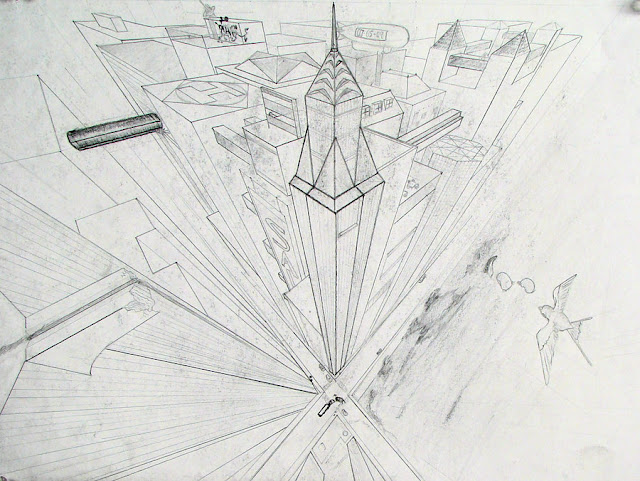3 point perspective
- First, set 2 vanishing points on the left and right sides of
your drawing surface. Make sure to set them wide enough apart so that
you will have room for whatever you are going to put in front of the
horizon.

- Next,
imagine a line (or draw one) connecting the first two vanishing points;
this is your horizon line. Place a third vanishing point somewhere
between the first two, but well below the horizon line.
The closer together you place these points, the more extreme the “fish-eye lens” effect will be. The further apart the points are, the less effect you'll see from perspective.

- Now
that you have your 3 vanishing points, let's create a flat surface
(like the roof of a boxy office building). Draw 2 lines from the left
vanishing point diagonally toward the right side of the drawing surface.
Next draw 2 lines from the right vanishing point which intersect both the other lines. Connect the points where the 4 lines intersect and you have just defined the roof of your building.

- Connect
the corners of the roof to the vertical vanishing point down below. At
this point your guide lines should resemble something like an ice cream cone (possibly
tilted). These lines are “vertical” in your painting (never mind what
the slant is on the paper—in the 3 point perspective frame of reference,
they're vertical).
- Pick the desired height of your building and mark it on the middle vertical line.

- Draw
lines from the base point you just marked to both the left and right
vanishing points. Where they intersect your other vertical lines defines
the base of your building (and the walls).
- You can add features like windows or a sloped roof to suit your needs. Remember to make the windows and other architectural features subject to the same law of perspective. Same with trees and anything else you put in the painting.
When the vanishing point is below the horizon line, as in the above example, you have a bird's-eye view looking down on the scene. In a worm's-eye view, you are looking up at things and the vanishing point is above the horizon. Otherwise, you follow the exact same procedure as before.



No comments:
Post a Comment